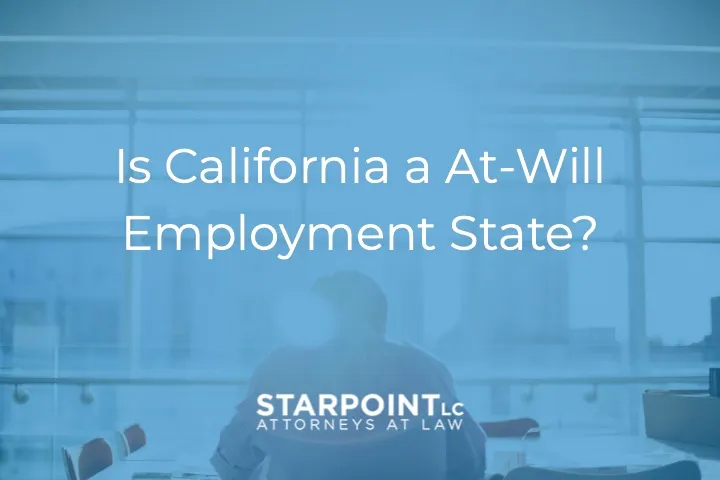Is California an At-Will Employment State?
Learn the key exceptions to California’s at-will employment rule and when a wrongful termination claim may apply.
Employment Law
5 min read


If you recently lost your job, we’re sorry, and we imagine you have plenty of questions.
Many recently terminated employees who want to file wrongful termination claims in California are probably asking, is California an at-will state? Generally, the answer is yes.
But don’t give up on a wrongful termination suit just because many jobs fall under at-will employment in California—there are exceptions to this rule.
If you have recently been terminated from your job and believe you were wrongfully terminated, our California employment attorneys are ready to fight for you.
Contact the experienced team at Starpoint Employment Lawyers to learn how we can help you.
California At-Will Employment Law
Under California law, an employer can typically fire you at any time, with or without good reason.
This is at-will employment. And this right cuts both ways, meaning an at-will employee can quit their job at any time without having a good reason.
The freedom of not being tied to a job for longer than you want is a good thing. But it can be daunting to know that your job could end at any time even if you haven’t done anything wrong.
Do you, as an employee, have any rights that protect you from an arbitrary termination? You do, but it depends on your circumstances.
At-Will Employment Exceptions in California
There are some at-will employment exceptions in California that could give you the right to sue your employer for wrongful termination.
Generally, at-will employment rules don’t apply when:
- Certain public sector employees lose their jobs;
- Certain employees lose their jobs in violation of express employment contracts or collective bargaining agreements;
- Certain employees lose their jobs in violation of implied employment contracts;
- Employees are terminated for discriminatory reasons; or
- Employees lose their jobs for reasons that are against public policy.
There can be a lot of nuances to measure when determining whether one of these at-will employment exceptions applies to you. An experienced California employment attorney can help determine whether you have a claim.
Job Protection for Public Sector Employees
Many government employees can’t be fired without good reason.
For example, Sections 7.1 and 7.2 of San Diego’s Civil Service Rules state that Classified Service employees in the county can’t be fired unless they’ve had certain issues, including:
- Job performance issues;
- Issues with their attitude or character;
- A lack of capacity to perform essential job functions;
- Bringing scandal to their position or agency;
- Criminal problems; and
- Instances of causing public harm.
A public sector employee who loses their job might be entitled to a hearing regarding their termination and certain remedies if they prove their termination wasn’t just.
Job Protection for Employees with Express and Implied Employment Contracts
Although California generally provides the at-will employment option for most jobs, an employer and an employee can choose to enter into a contract to make their relationship a little more binding.
These employment contracts can be expressed or implied, and their ability to protect you from termination without cause depends on their terms.
Collective bargaining agreements are another form of employment contract that can protect you from losing your job under certain circumstances.
Contract terms that could protect you from termination without cause can include:
- Terms promising progressive disciplinary action before termination;
- Terms regarding your employment obligations; and
- Terms regarding the length of your employment.
If you have an employment contract, pay close attention to the job duties your employer states you must fulfill.
If your employer fires you for failing to perform a job task that wasn’t a part of your obligations, you might have a claim for wrongful termination.
Also, if your contract states that your employer is supposed to last for a set amount of time and your boss fires you early and without good cause, you might be able to receive a severance package or settlement.
Job Protection Against Discriminatory Firings and Firings that Violate Public Policy
Regardless of whether your job is at-will or not, there are some terminations that the State of California and the federal government don’t tolerate.
Just because an employer could fire you for “no good reason” doesn’t mean they can fire you for a “bad reason.” In California, your employer generally can’t fire you based on your:
- Race,
- Color,
- Ancestry,
- Disability,
- Age (40+),
- Genetic information,
- Marital status,
- Pregnancy,
- Medical condition,
- Military/veteran status,
- Nationality,
- Religion,
- Gender or gender expression,
- Sex,
- Sexual orientation,
- Attempt to access workplace benefits or exercise workplace rights, or
- Attempts to report wrongdoing in the workplace.
Job discrimination is illegal if your employer does it because you’re a member of a protected group, or your employer thinks that you’re a member of a protected group. Federal law has many of the same rules against termination.
If you’ve suffered this kind of wrongful termination, you can file a complaint with the U.S. Equal Employment Opportunity Commission, and/or the California Department of Fair Employment and Housing.
Sometimes proving discrimination can be difficult, but that doesn’t mean you don’t have a good case.
An experienced attorney can gather and effectively present the evidence you need to receive damages or other remedies in a wrongful termination complaint.
Contact a California Employment Attorney Today to Protect Your Employment Rights
Is California an at-will state? Yes, but those rules for at-will employment in CA might not protect your employer.
If you think your employer wrongfully fired you, speak to an attorney immediately. Even if your employment was at will, there could be many reasons why the circumstances of your firing entitle you to damages or other remedies.
The attorneys at Starpoint Employment Law have the experience, compassion, and commitment to guide you through the hard times and win justice on your behalf.
We give each case our focus and a detailed review so we can develop a winning strategy that suits you best. Reach out to us online, or call us at (310) 424-9971 for a free consultation. We’re available 24/7.
Employment Law
Contact Us
You Don’t Have to Figure This Out Alone.
Whether you were injured or mistreated at work, we’ll explain your options clearly — and guide you through every step. No fees up front. No pressure. Just answers.




